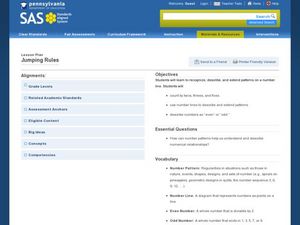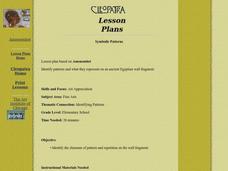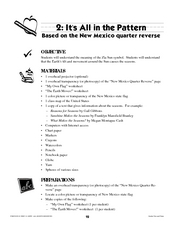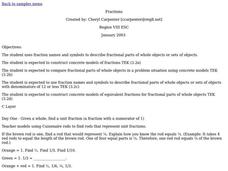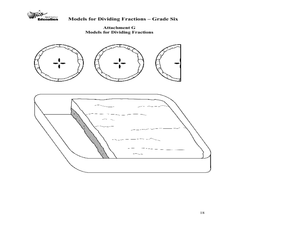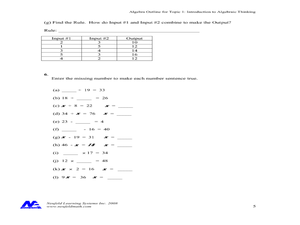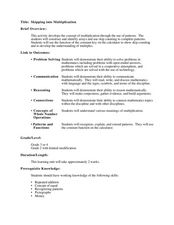Curated OER
Jumping Rules
First graders practice identifying number patterns. In this basic patterns lesson, 1st graders use a large number line and jump to certain numbers to create, identify or extend a pattern. This lesson includes a script to guide the teacher.
Alabama Learning Exchange
Find a Pattern Using Children's Literature
Sixth graders listen to Demi's, On Grain of Rice: A Mathematical Folktale. They use the problem solving strategy of finding a pattern to determine the number of rice Rani will receive after 30 days. They create a spreadsheet which...
Curated OER
Number Scrolls
Students write the number line. In this numbers lesson, students write numbers in numeric order on a number scroll. They find patterns within this number line.
Curated OER
Using Tens Frames To Build Addition And Subtraction Facts To Ten
Students review the basic addition facts through ten. They use tens frames to show number patterns and number families. They also form subtraction facts to ten using dot patterns on a quinary frame. Given a number sentence they find...
Curated OER
Symbolic Patterns
Learners identify patterns and what they represent on an ancient Egyptian wall fragment. Artists often repeat shapes, lines, and forms to create patterns. Several examples of repetition and pattern appear in this wall fragment.
Bowland
Fashionista
So trendy! Show your class how to identify trends in sales patterns using mathematics. Scholars use a software simulation to collect data on age groups, price, and sales at a fashion store. This data allows individuals to determine the...
University of Colorado
Are All Asteroids' Surfaces the Same Age?
There are more than 600,000 asteroids in our solar system. Pupils analyze images of two asteroids in order to determine if they are the same age. They count craters for each asteroid and compare numbers.
Curated OER
It Has Been Rubbish For Years
Students are presented with the problems of percentages and focus upon numbers in contrast to 100. They calculate problems with money and are engaged with the use of games as a teaching tool. Students also interpret data as presented in...
EngageNY
Close Reading of Nasreen's Secret School: How Do People Access Books in Afghanistan?
Third graders continue to practice the close reading skills of capturing the gist and reading again for important details in the sixth lesson in a larger unit. This is a great beginning-of-the-year unit for establishing visible thinking...
Illustrative Mathematics
The Stamp Collection
By using language like "half of the stamps," children are exposed to patterns in arithmetic that requires solving a two-step word problem. This type of language opens a new door for transitioning learners toward understanding fractions...
EngageNY
Division of Integers
The 12th segment in a 25-segment series looks at the division of integers and how the signs of the dividend and divisor affect the sign of the quotient. Pupils start with multiplication and division facts of whole numbers and create the...
Curated OER
It's All in the Pattern
Here is a fantastic, nine-page, multi-session lesson plan on the Zia Sun Symbol (found on the New Mexico state flag), and the seasons of the Earth. Everything you need to implement the lesson plan is here, and the many engaging...
Curated OER
Fractions
Young mathematicians use fraction names and symbols to describe fractional parts of whole objects or sets of objects. They construct concrete models of fractions, and compare fractional parts of whole objects in a problem situation using...
Curated OER
Understanding Fractions - Cookbook Comparisons
Learners explore equal fractions in relationship to a whole unit. They fold strips of paper into halves, thirds, etc. and compare them to the first strip which represents a "whole unit." Fractional parts are identified and compared.
Curated OER
Skip Counting to Music
Your youngest mathematicians skip count by 2's, 5's, and 10's as they sing along to a Hap Palmer song that helps them remember the patterns. Students practice in whole group and then individually with the worksheet provided, using the...
Curated OER
Quirky Quatrain Poetry Lesson
Middle schoolers discover what a quatrain is, and are taught the three poetic devices: alliteration, hyperbole, and onomatopoeia. Everyone chooses a favorite hobby or activity, then attempts to write a poem about it. They must write two...
Ohio Department of Education
Models for Dividing Fractions - Grade Six
Fifth and sixth graders use food and candy to help them represent division of fractions and develop algorithms to solve fraction problems. They discuss dividing whole numbers by fractions. Pupils use sticks and chocolate bars to...
Curated OER
Introduction to Algebraic Thinking
In this introduction to algebraic thinking, students perform given calculations. They draw a sequence of pictures to explain the equation. This five page worksheet contains six multi-step problems.
Curated OER
Patterns
Fifth graders explore patterns. In groups, 5th graders participate in a "Pasta Pattern" activity. Given a bag of pasta, classmates sort pasta by shapes. They use pasta pieces to model different patterns. Students complete a bean...
Illustrative Mathematics
Gotham City Taxis
Taxi! Have your travelers figure out how far they can go in a taxi for $10.00. They must account for the mileage rate and tip in their calculation. They can set up a table or make an equation to solve for the exact mileage they can...
Curated OER
Skipping Into Multiplication
Young mathematicians study the relationship between skip counting and multiplication. They build on skip counting skills and examine arrays while studying multiplication. Resources are provided.
Curated OER
Indiana Applied Skills Assessment Sample
In this Applied Skills Assessment worksheet, 5th graders complete a sample state assessment for Language Arts and Mathematics for 5th graders. They read a writing prompt and complete a writing activity that follows, answer various types...
Curated OER
Race and Ethnicity in the United States
Students explore race and ethnicity as it is defined by the U. S. Census Bureau. They compare data from 1900, 1950, and 2000 and identify settlement patterns and changes in population. In groups, they map these changes and discuss...
Curated OER
Look At Those Leaves!
Students collect, measure and classify leaves. In this inquiry-based sorting and classifying lesson, students look at various types of leaves they have collected and measure them using a standard unit of measurement. Next, they relate...
